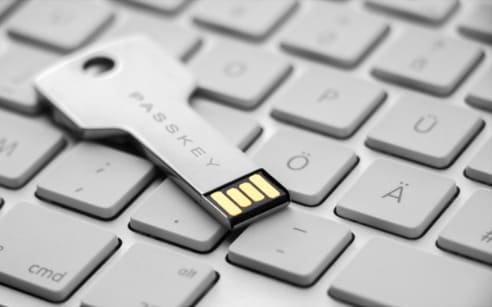Phishing-Resistant MFA
Advanced authentication that protects your business even when someone clicks a malicious link, because one wrong click shouldn’t risk your company.
Advanced authentication that protects your business even when someone clicks a malicious link, because one wrong click shouldn’t risk your company.
Multi-factor authentication (MFA) has been a security staple for years, requiring something you know (password) and something you have (often a code sent to your phone). But sophisticated scammers and cyber criminals have evolved their tactics, learning to use technology to crack passwords, intercept MFA codes or trick users into sharing them.
In fact, 84% of UK businesses that experienced cyber breaches in 2023/24 were targeted by phishing attacks – many bypassing traditional MFA completely.
The problem isn’t careless employees. It’s that we’re asking people to make perfect security decisions during their busiest moments:
This is where phishing-resistant MFA makes the difference – providing protection that works even when we’re human and make innocent mistakes.
Most businesses exploring phishing-resistant security share similar concerns:
Phishing-resistant MFA represents a fundamental shift in how we secure digital access. Instead of relying on information that can be phished or stolen, these solutions create security that’s tied directly to physical devices and cannot be compromised through social engineering.
As shown in our IT Security Journey roadmap (above), these advanced authentication technologies sit at the heart of a mature security posture, particularly at the Premium and Enterprise security levels where phishing-resistant MFA becomes a critical component of your multilayered defence strategy.
 1. Passkeys: Security Tied to Your Device
1. Passkeys: Security Tied to Your DevicePasskeys transform how we protect access to business systems by linking authentication to your specific device rather than information that can be stolen. How Passkeys Work
When you set up a passkey:
Unlike passwords or one-time codes, no secret information is ever transmitted during the login exchange. Even if someone tricks you into clicking a malicious link, they can’t access your accounts without your physical device.
 2. FIDO Security Keys: Portable, Physical Protection
2. FIDO Security Keys: Portable, Physical ProtectionFIDO security keys take the same technology found in passkeys but build it into a physical device that provides even greater flexibility and control.
How FIDO Keys Work:
While passkeys and FIDO security keys offer the most straightforward implementation of phishing-resistant security, a comprehensive security posture requires multiple layers working together.
As highlighted in our IT Security Journey above, these complementary technologies become increasingly important as you progress toward Premium and Enterprise Security Leadership.
 3. Risk-Based Conditional Access
3. Risk-Based Conditional AccessThink of this as a digital security guard that adjusts verification requirements based on context:
If the system suspects unusual activity, then it will either ask for extra verification or even block access until it’s sure it’s really the correct user on the account.
 4. Token Protection
4. Token ProtectionA token is a digital credential that keeps you logged in after authentication, similar to a wristband you might receive after showing ID to enter an event.
Token protection prevents token theft, a technique used to bypass traditional MFA:
The technology involved with this is still in its infancy and is similar to how passkeys are created.
 5. Certificate-Based Authentication
5. Certificate-Based AuthenticationCertificate-Based Authentication (CBA) operates similarly to passkeys and token protection, but it uses different technology for encryption and authentication and is centrally managed.
Phishing-resistant technologies play a crucial role in your IT Security Journey, with different solutions becoming relevant as your security posture matures. Rather than standalone tools, these technologies integrate with and enhance your overall security framework at each stage.
 Basic Security Foundation
Basic Security FoundationAt this stage, you’re establishing fundamental security controls. While traditional MFA begins here, this foundation creates the security baseline necessary before implementing more advanced authentication methods.
Click Here to discover more about the Basic Security Foundation tier.
 Baseline Security Practices
Baseline Security PracticesThis tier introduces more proactive security measures like standard phishing protection (typically awareness training and basic filtering) and getting ready for Cyber Essentials certification.
At this stage, you’re building awareness of phishing threats and implementing the prerequisite account security controls that phishing-resistant technologies will enhance.
Click Here to discover more about the Baseline Security Practises tier.

This is where phishing-resistant authentication becomes essential.
As shown in the security journey roadmap, these premium enhancements work together with phishing-resistant authentication to create a more resilient security posture.
Click Here to discover more about the Premium Security Enhancements tier.
 Enterprise Security Leadership
Enterprise Security LeadershipAt this level, authentication security becomes fully integrated with your broader security governance, creating a comprehensive defence system that protects against even the most sophisticated attacks.
Click Here to discover more about the Enterprise Security Leadership tier.

Our approach to security is always multilayered and contextual – we implement phishing-resistant technologies as part of your overall IT Security Journey, not as isolated solutions.
We’re not your typical IT security provider. As architects of our own IT Security Journey framework, we understand how phishing-resistant technologies fit within a broader security maturity roadmap.
Here’s what makes us different:
We Get Business: We understand security must support your operations, not hinder them. Our implementations balance protection with productivity.
We Understand Human Nature: We know even your most dedicated employees can make innocent mistakes during rushed moments. That’s why we implement security that works even when we’re human.
Real Experience: As early adopters of passkeys and FIDO security keys, we’ve already implemented these solutions for businesses like yours, strategically positioning them within your security journey. We understand not just the technologies themselves, but how they complement your existing security controls.
Service That Shows We Care: When transitioning to new security measures, responsive support makes all the difference. Our award-winning team ensures your questions never go unanswered.
The Perfect Size: We’re big enough to have deep security expertise but small enough that you’ll know your security team by name. No generic advice or cookie-cutter solutions – just real protection tailored to your business.
Let’s discuss how phishing-resistant MFA can enhance your security posture, regardless of where you are in your Client IT Security Journey – whether you’re building a solid foundation or advancing toward enterprise-level protection.
Phishing-resistant MFA (Multi-Factor Authentication) is an advanced form of authentication that cannot be compromised through social engineering or phishing attacks. Unlike traditional MFA methods that rely on one-time codes or push notifications (which can be intercepted or tricked from users), phishing-resistant methods use cryptographic techniques that bind authentication to specific physical devices and cannot be stolen or duplicated through deception.
The most common forms of phishing-resistant MFA include passkeys and FIDO security keys, which use public-key cryptography to ensure that authentication cannot occur without the actual physical device, even if a user is tricked into visiting a malicious website.
Passkeys use cryptography to authenticate you securely without needing a password. They rely on a pair of mathematically linked keys:
When you try to log in:
The key advantage is that your private key never leaves your device, and nothing sensitive is transmitted or stored by the service that could be reused or stolen. Even if a hacker builds a perfect replica of a login page, they can’t intercept or replay your authentication – because it depends entirely on your physical device and its cryptographic key.
Passkeys and FIDO security keys are both based on the FIDO2/WebAuthn standards and offer phishing-resistant authentication, but they differ in how they’re deployed and managed.
Passkeys:
FIDO Security Keys:
Both options provide a high level of protection, but businesses often prefer FIDO security keys when they need greater control – for example, issuing keys to staff in finance, IT, or compliance roles, or supporting access across multiple non-managed devices.
While traditional MFA (like SMS codes, authenticator apps, or email links) still offers better protection than passwords alone, it has become increasingly vulnerable to advanced attack methods:
These attacks succeed because traditional MFA still requires human involvement and decision-making, which can be manipulated.
Phishing-resistant MFA removes this risk by using cryptographic authentication tied to your device. The login process can’t be completed without possession of that device, and it doesn’t rely on codes, approvals, or user input – making it resistant to phishing, token theft, and social engineering.
The right solution depends on your business’s needs and where you currently are in Lumina’s Client IT Security Journey. We tailor our recommendations to ensure your authentication strategy matches your operational environment, technical maturity, and compliance goals.
If you’re progressing through Premium Security Enhancements:
Passkeys may be the right fit if:
FIDO Security Keys may be the better choice if:
If you’re moving toward Enterprise Security Leadership:
At this stage, we recommend a layered strategy that may combine multiple phishing-resistant methods:
During your initial consultation with Lumina, we’ll assess where your business sits on the Security Journey and recommend the right phishing-resistant MFA strategy to support your long-term growth and resilience.